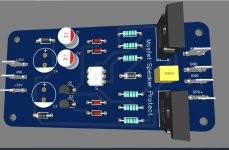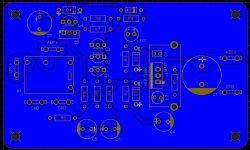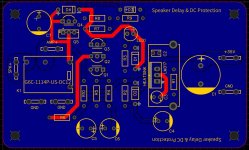One can also conclude that after using them for years and never having a problem with signal dropout, they are fine for the purpose.
Not that I disagree with you - I've had problems with dropouts using Omron for speakers. Wrong relay type clearly... But in the case of switching signal, the HF I linked works perfectly.
Not that I disagree with you - I've had problems with dropouts using Omron for speakers. Wrong relay type clearly... But in the case of switching signal, the HF I linked works perfectly.
No that is not how parts are selected and nothing can be concluded from just 1 situation/example in which they don't cause trouble (yet) but I take it is low price that was parameter #1? Low price based decisions are always defended to the very end with various valid (cough) reasons given why. The contacts of such relays need current to work OK. This will not happen when switching signal voltages but have it your way.
Back to topic!
Back to topic!
Last edited:
I've used hundreds of these for this purpose, Jean-paul... This isn't just a one off sample.
But yes I understand that as I already said in the last reply... This relay happens to work for the purpose as does the same form version by TE Connect https://www.mouser.ca/ProductDetail/TE-Connectivity-Schrack/RTE25012?qs=lV6XMjzHksNJpZWWPlc1Rw==
They use AgNi 90/10 gold plated contacts...
In any case, all of the relays I've linked would work for a speaker protection... The 4PDT I posted should be doubled up to make it DPDT.
But yes I understand that as I already said in the last reply... This relay happens to work for the purpose as does the same form version by TE Connect https://www.mouser.ca/ProductDetail/TE-Connectivity-Schrack/RTE25012?qs=lV6XMjzHksNJpZWWPlc1Rw==
They use AgNi 90/10 gold plated contacts...
In any case, all of the relays I've linked would work for a speaker protection... The 4PDT I posted should be doubled up to make it DPDT.
Last edited:
Relays with MOSFETS?! Avoiding poor quality parts is not that hard, just choose quality parts. No worries at all. It is old fashioned but using semiconductors for switching has not brought me much satisfaction. Even source switching with special ICs is worse sounding than relays.
OK, so I'll stick with the classic relay and try to choose some good quality...Relays with MOSFETS?! Avoiding poor quality parts is not that hard, just choose quality parts. No worries at all. It is old fashioned but using semiconductors for switching has not brought me much satisfaction. Even source switching with special ICs is worse sounding than relays.
Don't listen to me but try it out yourself once and then discover that relays are either reliable or not. Simple.
The distinctive "click" is liked by many just like the silent power on/off. A nice extra could be a blinking LED going to continuous light when the relay is activated. If you like a Christmas tree on amplifiers then a red error condition LED can be added too.
The distinctive "click" is liked by many just like the silent power on/off. A nice extra could be a blinking LED going to continuous light when the relay is activated. If you like a Christmas tree on amplifiers then a red error condition LED can be added too.
Friends, I finally chose this type: G6C-1114P-US-DC12, looks good quality 🙂
@Fully sealed, contact material: Silver Alloy (Ag), Price: 8,27 €
So if there are no objections, I will modify the board for this type of relay tomorrow.
@Fully sealed, contact material: Silver Alloy (Ag), Price: 8,27 €
So if there are no objections, I will modify the board for this type of relay tomorrow.
For almost the same price, they have a new product for hi inrush... 16A rating. I don't know if you saw it...
https://www.mouser.ca/datasheet/2/307/Omron_03172021_G5RL_K1A_EL_datasheet_EN-2141231.pdf
https://www.mouser.ca/datasheet/2/307/Omron_03172021_G5RL_K1A_EL_datasheet_EN-2141231.pdf
Seems a better deal. Inrush resistant ..and not allergic to capacitive loads as well. Make sure other brands have relays with the same footprint (just in case). Some that repair older amplifiers can tell stories about unique relays nowhere to be found anymore.
Last edited:
Can switch up to 125 V DC as long as the product of the DC voltage and the DC current doesn't exceed 300 W and it has a specified minimum load of 10 mA, 5 V. Sounds like a good choice.Friends, I finally chose this type: G6C-1114P-US-DC12, looks good quality 🙂
@Fully sealed, contact material: Silver Alloy (Ag), Price: 8,27 €
So if there are no objections, I will modify the board for this type of relay tomorrow.
Maximum switching voltage only 24 V DC, though.For almost the same price, they have a new product for hi inrush... 16A rating. I don't know if you saw it...
https://www.mouser.ca/datasheet/2/307/Omron_03172021_G5RL_K1A_EL_datasheet_EN-2141231.pdf
@ 5A....some versions even 16A. Not an issue when it does need to switch off a defective power amplifiers output carrying DC the device will need repair anyway (possibly being replaced with a new amplifier). Normally DC offset and AC are switched. The "handbrake function" is not needed often I hope.
Just think of the final outcome: a defective amplifier, in extreme cases a now bad relay and 2 100% OK loudspeakers.
Just think of the final outcome: a defective amplifier, in extreme cases a now bad relay and 2 100% OK loudspeakers.
Last edited:
Reading relay datasheets is not a favorite pastime. It is a little bit nitpicking if you check specifications of the relays that do break down in ready made amplifiers. I have seen speaker relays with 2A rated gold contacts. As usual the bad choices of others have given relays a bad reputation.
The Amplimo ones seem to have the best cards though as they seem to be designed for this sole purpose. No first hand experience, I just use Schrack RT series.
The Amplimo ones seem to have the best cards though as they seem to be designed for this sole purpose. No first hand experience, I just use Schrack RT series.
Last edited:
Or a defective amplifier, relay with spot welded contacts and 100 % defective loudspeakers.@ 5A....some versions even 16A. Not an issue when it does need to switch off a defective power amplifiers output carrying DC the device will need repair anyway (possibly being replaced with a new amplifier). Normally DC offset and AC are switched. The "handbrake function" is not needed often I hope.
Just think of the final outcome: a defective amplifier, in extreme cases a now bad relay and 2 100% OK loudspeakers.
Apparently you assume that the relay will fail open and will therefore disconnect the load properly. I'm more worried about the relay failing shorted.
I know relays can fail shorted when the inrush current at switch-on is way too high, I don't know what the usual failure modes at switch-off are.
Wow, dangerous stuff. I don't worry that the relay will fail while opening, in fact I don't worry at all when choosing a good one. Apart from the relatively non damaging action closing/opening contacts to prevent power on/off plops it is meant to open contacts when the amplifier goes bad so high DC on the output(s). If it fails with open or intermittent contacts we have the situation as happens with wrongly chosen relays: no sound or intermittent sound and something relatively innocent to remedy. We still have 2 good loudspeakers.
When the relay fails with shorted contacts well then we have the situation as in many amplifiers as published here. No protection of the loudspeakers. When now an unlikely second error occurs at the same time i.e. the amplifier goes bad then we have the situation as with many unprotected amplifiers. That is 1 or 2 dead loudspeakers. Chances of 2 failures at the same time are small. A user will however notice the amplifier to have power on/off phenomena or even the popular farting. That should be an indication that the amplifier needs servicing. The second error will not occur with destructive effects when someone takes action adequately. Two weeks after the repair the amplifiers MOSFETs decide to die and suddenly there is 50V DC at the outputs of both channels and 60,000 µF of cap magic waiting to discharge in those precious loudspeakers. Nothing happens besides a defective amplifier so 2 good loudspeakers. Since we don't hear anything anymore it is wise to use a red LED for failure indication.
I know arc flashing from high voltage practice. I have yet too see a relay in a 100W amplifier go bad from arc flashing 🙂
Please mind that many devices as published here lack any form of protection (or even muting). When these devices go bad loudspeakers will burn for sure. So the discussion was nice and do whatever you think is best but if one has expensive loudspeakers one has a choice what to do to keep them healthy.
When the relay fails with shorted contacts well then we have the situation as in many amplifiers as published here. No protection of the loudspeakers. When now an unlikely second error occurs at the same time i.e. the amplifier goes bad then we have the situation as with many unprotected amplifiers. That is 1 or 2 dead loudspeakers. Chances of 2 failures at the same time are small. A user will however notice the amplifier to have power on/off phenomena or even the popular farting. That should be an indication that the amplifier needs servicing. The second error will not occur with destructive effects when someone takes action adequately. Two weeks after the repair the amplifiers MOSFETs decide to die and suddenly there is 50V DC at the outputs of both channels and 60,000 µF of cap magic waiting to discharge in those precious loudspeakers. Nothing happens besides a defective amplifier so 2 good loudspeakers. Since we don't hear anything anymore it is wise to use a red LED for failure indication.
I know arc flashing from high voltage practice. I have yet too see a relay in a 100W amplifier go bad from arc flashing 🙂
Please mind that many devices as published here lack any form of protection (or even muting). When these devices go bad loudspeakers will burn for sure. So the discussion was nice and do whatever you think is best but if one has expensive loudspeakers one has a choice what to do to keep them healthy.
Last edited:
- Home
- Amplifiers
- Solid State
- Simple protection with relay for amplifier up to 100W



